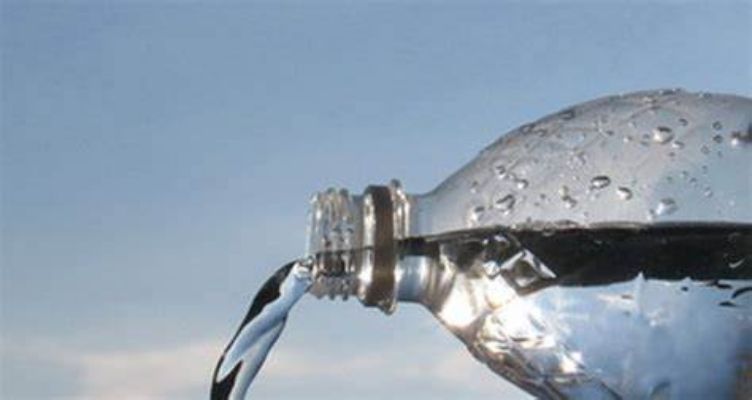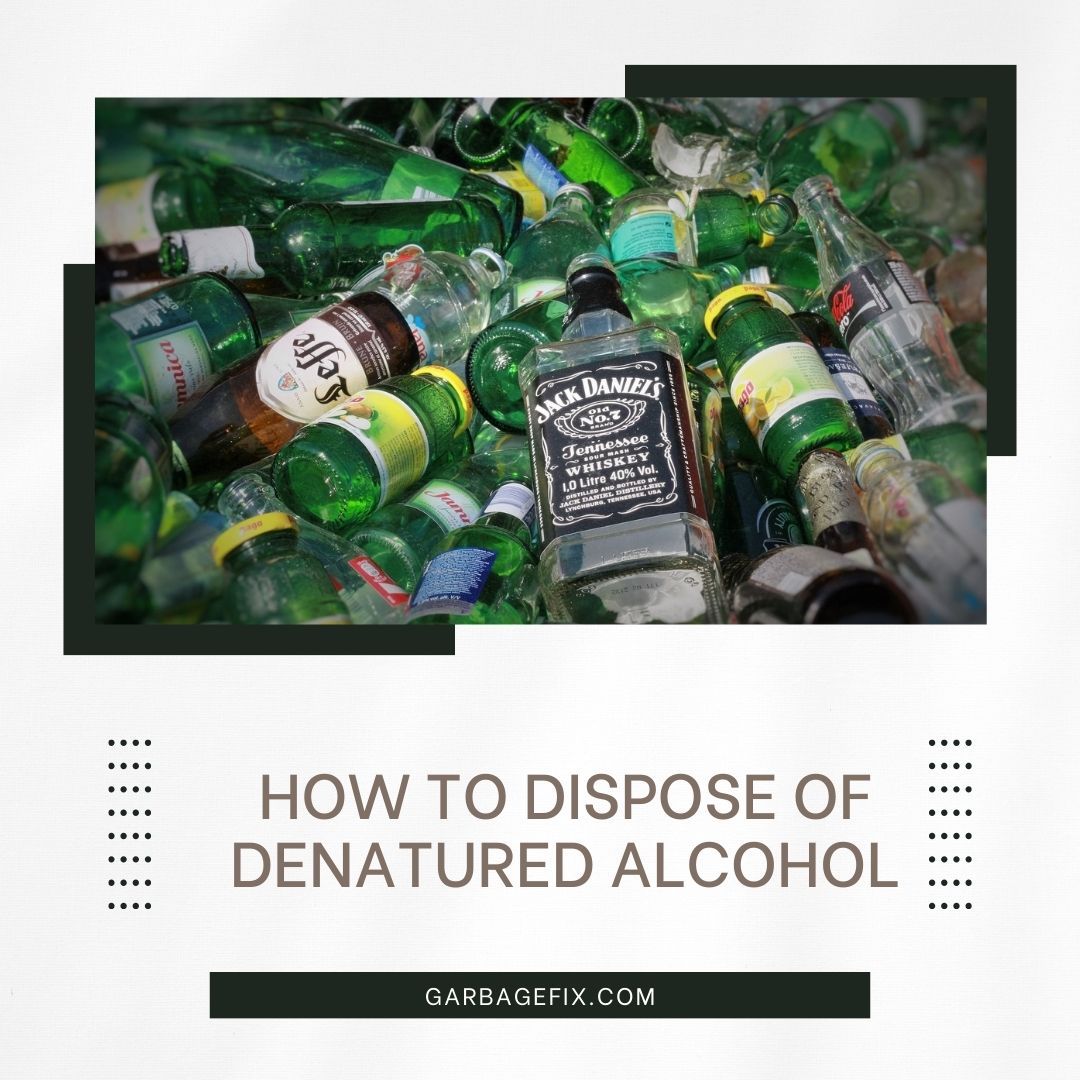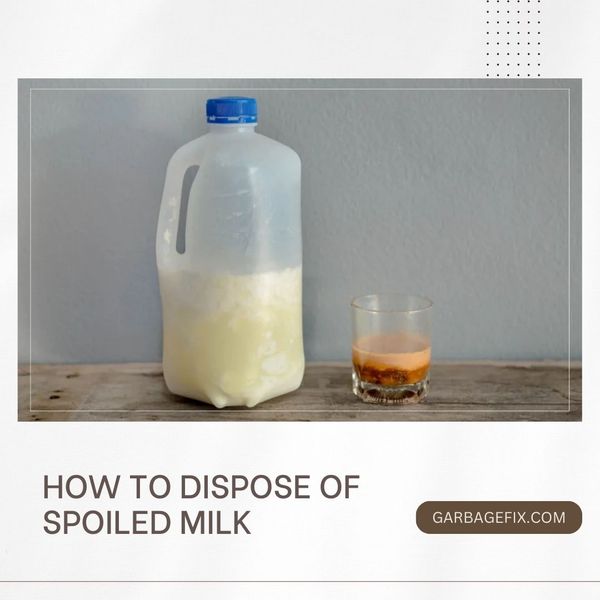To ensure you're handling it safely, it's strongly advised to contact a hazardous waste disposal service in your area. They're experts in dealing with substances like denatured alcohol and can handle its disposal properly.
In the meantime, if you need to store denatured alcohol temporarily, do so in a well-ventilated space, ensuring it's far away from any heat sources or things that can ignite it. Use a container specifically designed for hazardous materials to store it safely.
How To Dispose Of Denatured Alcohol? - Step-By-Step Guide

Here, we provide a step-by-step guide when you dispose of unwanted alcohol. We prefer that you follow all safety precautions, rules, and regulations.
Gather Your Materials
Before you begin the disposal process, ensure you have the following items ready:
- Denatured alcohol container
- Sealable containers for storage
- Personal Protective Equipment (PPE)
- Funnel
- Absorbent material (e.g., kitty litter, sand)
- Trash bags
Put on PPE
Prioritize safety by wearing the appropriate personal protective equipment, gloves, safety goggles, and protective clothing.
Let's begin with tutorial on how to dispose of old liquor:
Check local regulations: Before disposing of denatured alcohol, you must understand your local regulations regarding hazardous waste disposal. Contact your local waste management authority or visit their website to find out the specific guidelines for your area.
Store in a well-ventilated area
Ensure the denatured alcohol is stored in its original container or a designated, tightly sealed container. Keep it in a well-ventilated area away from heat sources and open flames.
Do not pour down the drain
Denatured alcohol should never be poured or flushed down the toilet as it can contaminate the water supply and harm the environment.
Label the container
If the original container is not suitable for long-term storage, transfer the denatured alcohol to a clearly labeled container. Use a permanent marker to write "Denatured Alcohol" on the container and any other relevant warning labels.
Seek a recycling program
Check for any hazardous waste recycling programs in your area. Many communities have designated drop-off locations or special collection events where you can safely dispose of denatured alcohol. Contact your local waste management authority or recycling center for their policies and procedures.
Contact a hazardous waste facility
If no recycling programs are available, contact a hazardous waste facility in your area. They can provide guidance on how to dispose of denatured alcohol safely and may offer drop-off services or schedule a pickup if necessary.
Transport safely
If transporting denatured alcohol to a designated facility, ensure it is securely packaged to prevent leaks or spills. Use appropriate packaging materials, such as absorbent pads or spill-proof containers, and follow any transportation guidelines provided by the facility or waste management authority.
Follow household hazardous waste collection days
Some municipalities organize annual or biannual household hazardous waste collection days. Take note of these events and plan to dispose of your denatured alcohol during these times properly.
Recycling Denatured Alcohol - Win-Win Solution for Businesses and the Environment
Recycling denatured alcohol is environmentally responsible and a smart move for businesses. By adopting this sustainable and cost-effective practice, companies can effectively manage their waste while reducing their environmental impact. Let's learn the step-by-step process of recycling denatured alcohol and explore the benefits it offers:
Step 1: Collection
Collection Denatured alcohol is collected from various sources, including manufacturing facilities and businesses. During this stage, it's crucial to ensure proper labeling and storage to guarantee safety and minimize potential risks.
Step 2: Testing and Analysis
Testing and Analysis Once collected, the alcohol undergoes testing and analysis. This helps determine its chemical composition, purity, and presence of any contaminants. This information plays a vital role in the subsequent recycling process.
Step 3: Purification
Purification Based on the analysis results, the denatured alcohol may undergo purification processes such as distillation or filtration. These processes are utilized to remove impurities, water, and any additives that make the alcohol unsuitable for consumption.
Step 4: Quality Control
Quality Control To ensure the recycled alcohol meets specific purity and quality standards, it undergoes rigorous quality control measures. This step is essential to guarantee the recycled alcohol's safety and suitability for various applications.
Step 5: Packaging
Packaging The purified and recycled alcohol is then carefully packaged into suitable containers for distribution across various industries that require solvents, fuels, cleaning agents, and more.
Step 6: Distribution
Distribution The recycled alcohol is distributed to industries where it can find a new purpose. Its applications range from being a solvent for industrial processes to a fuel substitute or a cleaning agent. The exact use depends on the purity and composition of the recycled alcohol.
Benefits of Alcohol Recycling for Businesses

- Environmental Benefits
By recycling denatured alcohol, businesses reduce the need for producing new alcohol products, which can be resource-intensive and environmentally harmful. Additionally, Recycling minimizes the release of harmful substances into the environment, thereby contributing to a healthier ecosystem. - Cost Savings
Recycling denatured alcohol can be a cost-effective practice for businesses. It eliminates the need to purchase new alcohol products while reducing expenses associated with hazardous waste disposal. - Compliance with Regulations
Properly recycling denatured alcohol ensures compliance with environmental regulations and hazardous waste disposal laws. This helps businesses avoid potential legal issues and fines, promoting a culture of responsible waste management. - Reduced Environmental Impact
By recycling alcohol, businesses actively reduce greenhouse gas emissions associated with producing new alcohol products. Moreover, it conserves valuable natural resources in alcohol production, minimizing environmental impact. - Positive Public Image
Businesses prioritizing responsible Recycling cultivate a positive public image. By demonstrating their commitment to sustainability and environmental responsibility, they can enhance their reputation among customers and stakeholders.
Why Recycling Denatured Alcohol is a Smart Move
Recycling denatured alcohol is a win-win solution for businesses and the environment. It offers a sustainable and cost-effective way to manage waste while minimizing environmental impact. By considering alcohol recycling options, businesses demonstrate their commitment to sustainable practices and contribute to the well-being of our planet.
FAQs
Can alcohol go down the drain?
No, it is generally not recommended to pour alcohol down the drain. If the alcohol is more than 20% alcohol by volume, it is considered hazardous waste and should not be disposed of in this manner. It is advisable to check local regulations for proper disposal methods.
Does denatured alcohol evaporate?
Does denatured alcohol evaporate?
Yes, denatured alcohol, like other types of alcohol, has a low boiling point and tends to evaporate quickly. However, the evaporation rate can depend on temperature and ventilation.
Is it illegal to throw away alcohol?
The legality of throwing away alcohol depends on local laws and regulations. In some cases, it may be allowed to dispose of small quantities of alcohol in regular trash or recycling bins. However, for larger quantities or certain types of alcohol, such as denatured alcohol, it is generally recommended to follow proper hazardous waste disposal procedures. It is advisable to check with local waste management authorities or visit their website for specific guidelines in your area.








